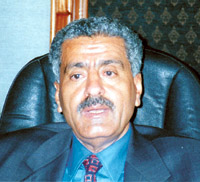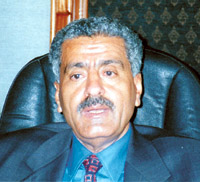
General Hussein Arab to YT: “I do assert that HIV disease is not a crime. The law does not have to arrest those infected and hold them accountable” [Archives:2001/14/Interview]
April 2 2001

Mohammed bin Salam from the Yemen Times met with him and discussed many of the issues and concerns in his ministry. During his term in office, the Interior Ministry has made commendable progress. This has revived the spirit in the security apparatuses through many activities including the installation of a new modern systems, specialized security machines and instruments.These new reforms within the security system is an effort to match the times and high technology worldwide.
Q: During the local elections some tragic events took place which claimed so many lives. What is the true number of victims?
A: The President has already referred to this in a press conference and I have nothing to add. Generally speaking, we anticipated the occurrence of some events as such. Hence, we had already drawn a plan to curb the spread of these events in many areas. Besides, Yemenis are armed and this is a new experience they are passing through. We view what happened as reasonable except for the big events in al-Radhmah and al-Haimah.
Q: A state of insecurity is dominating the country. This is marked by the ever-increasing number of killings, kidnapping incidents, thefts, high rate of crimes, etc. Security lapses agitate the citizens and impede the development process in the country. Has the Ministry taken any measures to curb the spread of these unsettling phenomena within society?
A: First and foremost, your assessment of the security situation is not at all true and is unreasonable. We can say that there is a security lapse if, for instance, crimes are proliferated and were not identified. However, this is not the case in our country. The security apparatuses came to discover almost 95% of crimes.
I feel sorry for the mis-comprehension many people have regarding the situation. This is ascribed to our sudden encounter to democracy, plurality and free press. I do assert that there is no security lapse in the country. There is no such ideal community where crimes are not committed. In the case of our country, crimes are in a reasonable proportion and are less in kind and number when compared to some neighboring countries. We do not object to the press writing on these issues. However, we do hope that papers will be objective and precise in their reports.
Q: The low income and bad living conditions of Yemeni soldiers have notably affected their performance to maintain security and order. Are there any plans to improve their living situation?
A: It has been the dream of the Interior Ministry to solve this problem. However, it is related to the economic situation of the country and I think that the political leadership is paying this the necessary attention. For example, there was a proposal for a 40% salary increase to employees affiliated with the Interior Ministry. It was not that big. However, the authorities are considering this and will increase their salaries gradually in accordance with the available economic resources.
Q: The issue of HIV (AIDS) is causing much concern in the Yemeni society. People believe there is a deficiency in the security apparatuses accusing them of not exerting efforts to curb the spread of HIV cases, at least through coordination with the Health Ministry. What are your plans in this regard?
A: HIV is a disease and is not a crime. I am responsible for the crimes. However, I am not in charge of controlling the diseases which may befall any section of the society. This is mainly the responsibility of the Health Ministry. We can make sure that all foreigners who come to the country should obtain an HIV-Free certificate.
I do assert that HIV disease is not a crime. The law does not have to arrest those infected and hold them accountable.
We hope that the Health Ministry will have a special hospital for HIV infected cases or a house where those infected are kept to help them out.
Q: The hijacking incident of the Yemenia airplane recently was a sure signal of the weak, backward state of inspection in the Yemeni airports. Has the Interior Ministry taken any measures to install state-of-the-art machines and detectors to detect weapons and narcotics as is the case in other countries?
A: We have seriously addressed this and the best sign of that is the special police for the borders’ outlets, ports and airports. Concerning new machines and instruments we are cooperating with the Americans to address this issue.
Q: Many investors ascribe their restraint to invest in the country to the state of anarchy and insecurity. Obviously, the Ministry is the source to blame. Have you got any plans to ensure a conducive security atmosphere for investment?
A: I assure all investors that security is ensured in the country and is better than at any time in the past. However, there are some other problems including lands disputes, and the weak application of judiciary system, which may tend to impede the investment process. Some cases are kept hanging in courts for years due to this problem.
Q: What about the female recruitment in the police? Many obstacles on this project are coming through. How would you comment on that?
A: There is an aggressive campaign against female work in general. Female recruitment is a public requirement and is of prime importance. There are many places where the presence of women is a must, including women guards, inspecting women in ports, airports, during investigation, etc.
With regard to the privileges, there won’t be any exceptional privileges for female soldiers. They will have the same rights as their male colleagues. They themselves are satisfied with this. They have an extraordinary enthusiasm and there is an unbelievable turnout of females to join the security authority.
When the authority announced for 200 female candidates, we had hundreds of applicants. However, out of them only 438 were chosen. I do assure you that there won’t be any lapse in the project of female recruitment and that the authorities are paying the attention needed. Time will be the best proof.
Q: There has been so many labels associated with the Islamic groups including terrorism, fanaticism, etc. Are there Islamic groups in Yemen? What are the parties backing them up?
A: These terms have been exhaustively used by many without any specification or recognition. Whoever has a long beard is looked at as a terrorist which is absolutely wrong. We, in the Interior Ministry, view the terrorist as the one who perpetrates terrorist crimes and is not the one who grows a beard.
The security apparatuses can not charge anyone with terrorism unless he is caught red-handed or there is some evidences to bear out his plotting to commit acts of sabotage.
Moreover, news that all these groups exist in Yemen is not true, particularly the extremist ones. Some of these groups may exist in Yemen. However, they are pursuing their activities within the framework of the law.
Q: There are some Islamic Institutes and universities officially working in Yemen. Some are thought to be related to some outside agencies abroad. How do you deal with these? How do you conduct your work?
A: With regard to official camps, universities and institutes, they are teaching some religious courses. These courses are within the framework of the Islam. It is not true that these are contradictory to Islam or to the five Islamic doctrines. The point is that activities of these institutes and universities must not be against the interest of the country or affect the stability or security of the state. In my point of view this issue has been blown out of proportion.
Q: It is believed that 20 thousand Arab Afghans and Yemenis came to Yemen from Afghanistan in 1993 supported by a neighboring country. How many of them are still here? Where are they now? How do you deal with them?
A: We do not have any recent, correct statistics of their number. Groups who used to be in Yemen at the time have already left the country after the war of 1994. By and large, the number of the Arab Afghans and Yemenis who used to be in the country at the time were more than 29 thousand.
The point is that whoever stays in Yemen should have an official visa and should have registered with the police office. He should never carry out actions that effect the security and stability in Yemen. Moreover, he should not be a previously convicted criminal.
Q: Tens of non-Yemeni teachers are still teaching in scientific institutes, universities and mosques as orators. Some are looked at as fanatics. How do you deal with them? How do they get into the country?
A: Any person, whether an Arab or a foreigner, who has an official permit from any ministry and has a visa to work into the country has the right to stay and work. For example, in al-Eyman University, recently we put conditions on foreigners who are working or studying there. They have to get an official permit from their embassies in Yemen, or their governments, in case they do not have embassies in Yemen. Anyone who does not meet the conditions is deported at once.
Q: Does the five million award the US announced for whoever reports any information on the attack on the US Destroyer Cole affect the Yemeni sovereignty?
A: No, it does not. Before this ad was published in newspapers, Americans discussed this with us. We made no objection to it, as long as it was of some use and would help in the investigation process.
Q: What have the border committees achieved so far? What about the news that the Saudi forces have advanced 24km from the South East and South West of Tha’ar mountain into the Yemeni lands?
A: Borders dispute with Saudi Arabia have been settled completely. Coordinates are now in the UN and Arab League. I would like to assert that our brothers in Saudi Arabia have started implementing the conditions agreed upon in the Jeddah Treaty. They have already withdrawn from areas before the agreed upon time. We have agreed on a two year time framework to finish every thing. We are also going to hold a meeting soon to finish all the procedures.
——
[archive-e:14-v:2001-y:2001-d:2001-04-02-p:./2001/iss14/intrview.htm]


